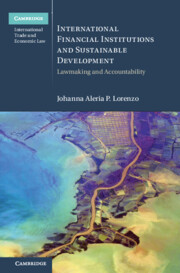Refine search
Actions for selected content:
2 results

International Financial Institutions and Sustainable Development
- Lawmaking and Accountability
-
- Published online:
- 09 June 2025
- Print publication:
- 26 June 2025
9 - How the World Bank’s Dispute Resolution Services Should Benefit Affected Persons and Borrower States
- from Part III - Trade, Finance and Investment
-
-
- Book:
- International Courts versus Non-Compliance Mechanisms
- Published online:
- 15 February 2024
- Print publication:
- 22 February 2024, pp 187-216
-
- Chapter
-
- You have access
- Open access
- HTML
- Export citation
